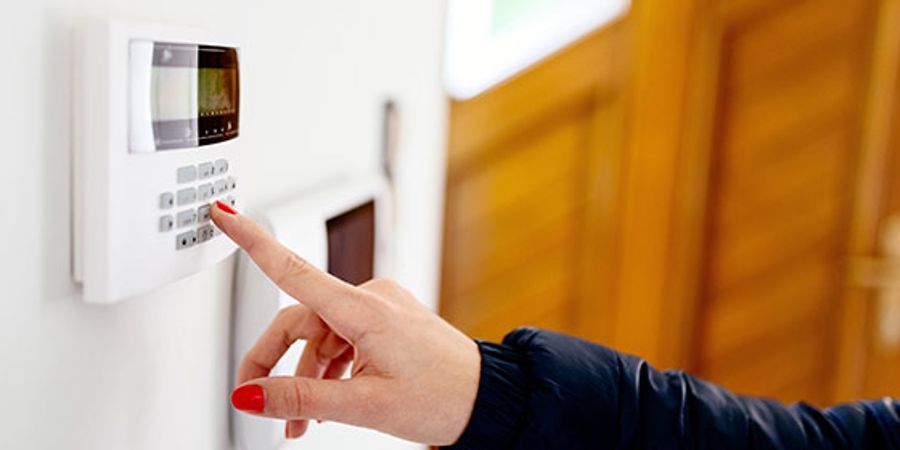Hardwired vs. Wireless Home Alarms: Pros & Cons
June 8, 2024

Ensuring the safety of our homes is a top priority. Home alarm systems have become indispensable in safeguarding our loved ones and property. When it comes to choosing the right system, the debate between hardwired and wireless home alarms is at the forefront. In this detailed article, we’ll delve into the pros and cons of both options, helping you make an informed decision for your home security needs.
Hardwired vs. Wireless Home Alarms: Which One Suits You?
When it comes to home security, choosing between hardwired and wireless alarm systems can be challenging. Let’s explore the strengths and weaknesses of each to help you decide which one aligns with your requirements.
Hardwired Home Alarms
Hardwired home alarms, as the name suggests, are systems that are physically connected to your home’s electrical wiring. Here are the pros and cons:
Pros
- Reliability: Hardwired systems are known for their reliability. They are less susceptible to interference, making them ideal for areas with a lot of electronic devices.
- Consistent Power: These systems draw power directly from your home’s electrical grid, ensuring they don’t run out of battery.
- No Signal Loss: Unlike wireless systems, hardwired alarms don’t experience a signal loss, offering seamless protection.
Cons
- Installation Complexity: Installing hardwired alarms can be complex and may require professional assistance.
- Limited Mobility: Since they are physically connected, you can’t move the sensors or control panels easily.
- Cost: The installation cost for hardwired systems can be higher due to the wiring and labor involved.
Wireless Home Alarms
Wireless home alarm systems operate using radio frequency to connect sensors and control panels. Here’s what you need to know:
Pros
- Easy Installation: Wireless systems are a breeze to install, often without the need for professional help.
- Flexibility: You can easily reposition sensors or add new ones as needed.
- Cost-Efficiency: The initial setup cost is generally lower than hardwired systems.
Cons
- Battery Dependence: Wireless systems rely on batteries, which need replacement periodically.
- Signal Interference: Interference from other electronic devices or walls can disrupt wireless signals.
- Signal Range: The range of wireless systems may be limited, affecting larger properties.
Comparing the Costs
When considering a home alarm system, cost is a crucial factor. Let’s break down the expenses associated with hardwired and wireless options:
Hardwired Costs
- Installation: Hardwired systems often require professional installation, which can cost between $500 and $1,000.
- Equipment: While equipment costs vary, expect to pay around $300 to $600 for sensors and control panels.
- Maintenance: Hardwired systems generally have lower maintenance costs due to their reliability.
Wireless Costs
- Installation: Wireless systems are DIY-friendly, saving on installation costs.
- Equipment: The equipment cost for wireless systems ranges from $100 to $500.
- Battery Replacement: Factor in the cost of replacing batteries every 2-3 years.
![]()
Rating 4.3/5
- Trusted name
- Customer-first policies
- 140+ years of experience
Hardwired vs. Wireless Home Alarms: Pros & Cons
Now, let’s summarize the key points of comparison between hardwired and wireless home alarms:
| Aspect | Hardwired Home Alarms | Wireless Home Alarms |
|---|---|---|
| Installation Difficulty | Complex | Easy |
| Reliability | High | Moderate |
| Mobility of Components | Limited | High |
| Initial Setup Cost | Higher | Lower |
| Maintenance Cost | Lower | Moderate |
| Battery Dependence | No | Yes |
| Signal Range | No limitations | Limited |
| Susceptibility to Interference | Minimal | Possible |
FAQs
Are wireless home alarms as reliable as hardwired ones?
Yes, wireless home alarms have made significant advancements in reliability, but hardwired systems still hold a slight edge due to their direct electrical connection.
Do wireless alarms work during power outages?
Wireless alarms typically have backup batteries, ensuring they continue to function during power outages.
Can I install a wireless alarm system myself?
Yes, many wireless alarm systems are designed for easy DIY installation, making them accessible to homeowners.
Are hardwired alarms better for larger homes?
Yes, hardwired alarms are often preferred for larger properties due to their extensive signal range.
What’s the average lifespan of wireless alarm system batteries?
Most wireless alarm system batteries last between 2 to 3 years before needing replacement.
Do wireless alarms require a Wi-Fi connection?
No, wireless home alarms operate on a separate radio frequency, not requiring a Wi-Fi connection. This independence from Wi-Fi can be especially advantageous for homeowners who are looking for cost-effective solutions. You can explore cheap internet offers available in your area, like those in Walnut Creek and Idaho Falls, to ensure you have a stable and budget-friendly internet connection.
Conclusion
In the debate between hardwired and wireless home alarms, there’s no one-size-fits-all answer. Your choice should align with your specific needs and preferences. Consider factors like installation, reliability, and cost to make an informed decision. Ultimately, both options offer effective ways to secure your home, ensuring peace of mind for you and your loved ones.